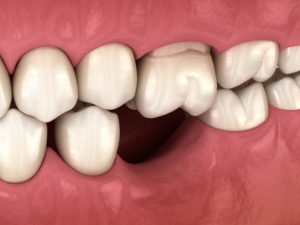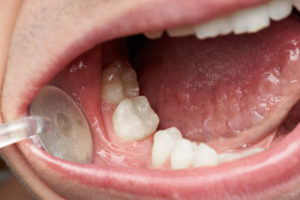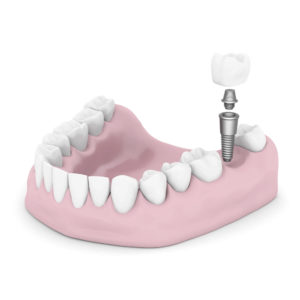Consequences of Missing Teeth
Hearing the phrase “Just pull it!” makes most dentists cringe. Why? Because there are consequences when you lose a tooth. We understand that some teeth have a hopeless prognosis and must be removed. We’re not talking about cases where extraction is the only option, and you opt to replace the missing tooth with a dental implant. The consequences that this blog will cover are those of removing a tooth and not replacing it.
Shifting of Teeth
It is the presence of neighboring and opposing teeth that maintain the position of the teeth. When a single tooth is missing, the teeth around it (on the sides and biting against it) will slowly move into the newly emptied space. The neighboring teeth will begin to lean sideways toward the empty space, and the opposing tooth (especially if the missing tooth is on the lower jaw) will drop down into the empty space below.
This also affects the cosmetics of the smile. This type of shifting can make teeth appear crooked since they lean at a different angle. It can also result in small gaps in the front teeth as the teeth in general shift back into an empty space.
Changes in the Bite
All of that shifting causes changes in the way the upper and lower teeth bite together. Bite changes can lead to TMJ problems, tooth sensitivity, gum recession, and cracked teeth. The reason this shifting is harmful to the bite is because teeth withstand chewing forces best from an angle that is parallel to their roots. When the tooth leans, the roots also lean, and then the biting force is no longer parallel to the root. Biting forces are naturally heavy in order to chew food. Putting a heavy force onto a tooth at an improper angle is bad.
Inadequate Chewing Force
 Unfortunately, people are much more likely to remove a back tooth because it does not affect the appearance of the smile. The problem with that mentality is that it negates the importance of the back in your ability to chew. Our molars have large, wide chewing surfaces made to grind food, which is an important first step in the process of digestion. Missing even one molar causes a drastic reduction in the effectiveness of chewing.
Unfortunately, people are much more likely to remove a back tooth because it does not affect the appearance of the smile. The problem with that mentality is that it negates the importance of the back in your ability to chew. Our molars have large, wide chewing surfaces made to grind food, which is an important first step in the process of digestion. Missing even one molar causes a drastic reduction in the effectiveness of chewing.
People missing multiple teeth often suffer from digestive problems and have a higher risk for choking on unchewed pieces of food.
Increased Risk for Gum Recession
Gum recession almost always occurs on the side of teeth facing the empty space. The presence of a tooth helps maintain the height of gum tissue between the teeth. If a tooth is missing, the gum has no pressure from adjacent teeth and slowly recedes down the root.
Gum recession also results from the shifting or leaning of teeth that commonly occurs when you extract a tooth. Changes in bite forces are an irritant to the gums and can cause recession, too. Losing a tooth causes you to also lose otherwise healthy gum tissue.
It is important to understand that replacing a missing tooth with an implant can prevent that gum loss if completed soon after the extraction. Waiting several years, however, allows the gums to recede more, and a dental implant will not “fix” them. Replacing a missing tooth with an implant as soon as possible allows you to maintain the healthiest, most natural gum tissue.
Increased Risk for Cracked Teeth
When you lose a tooth, the shifting and bite changes on the teeth around the missing one lead to an increased risk for cracked teeth. Again, the teeth can withstand the heavy forces of chewing when those forces hit the teeth at the correct angle. When bite forces hit a tooth at an inappropriate angle, the tooth is likely to crack under the stress.
A surface crack can cause sensitivity to hot or cold and pain on chewing. A crack that extends into the tooth may cause irreversible changes to the nerve within the tooth, which means a root canal treatment is necessary to keep the tooth. Some cracks spread all the way into the root of a tooth. Root fractures have a hopeless prognosis, meaning the tooth has only one treatment option: extraction.
How to Avoid these Consequences
 You can avoid the consequences of tooth loss by replacing the missing tooth as soon as possible. Dentistry prov15ides multiple different options for tooth replacement, and nothing beats a dental implant for replacing a single missing tooth. It recreates the natural anatomy as closely as possible and reduces the likelihood of these consequences. Replacing a missing tooth with a dental implant always improves your oral health!
You can avoid the consequences of tooth loss by replacing the missing tooth as soon as possible. Dentistry prov15ides multiple different options for tooth replacement, and nothing beats a dental implant for replacing a single missing tooth. It recreates the natural anatomy as closely as possible and reduces the likelihood of these consequences. Replacing a missing tooth with a dental implant always improves your oral health!
More Questions about Missing Teeth?
Call Designer Smiles today to schedule a consultation with Dr. Ann and Dr. Lauren. They can answer any of your questions about tooth loss, assess your unique situation, and discuss your options for replacement of missing teeth.
